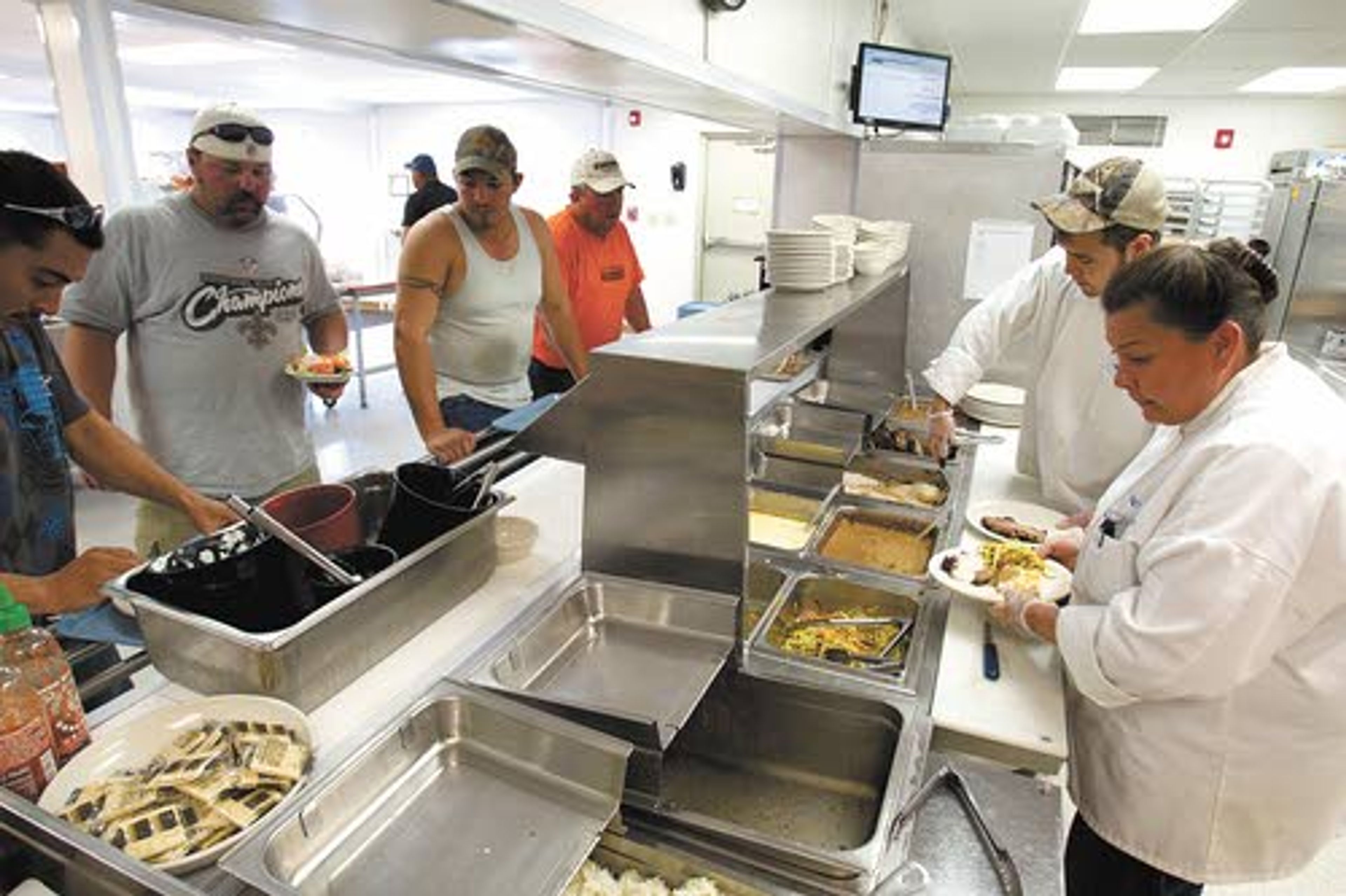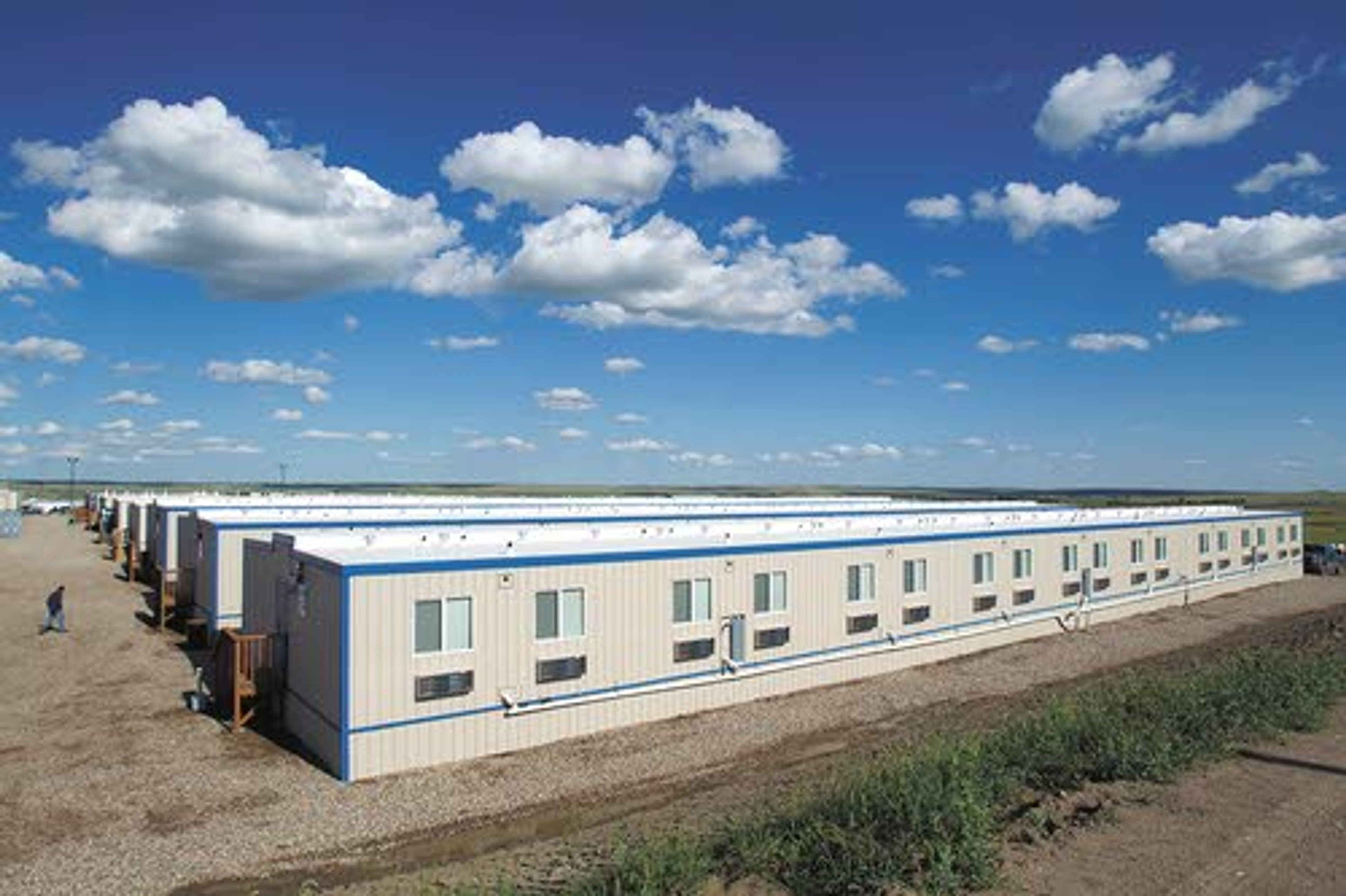Life in oil field 'man camp' not for everyone
Oil boom in North Dakota has fueled creation of temporary camps to house workers
WILLISTON, N.D. - You can almost smell the opportunity along U.S. Highway 2. It oozes deep from the sloping North Dakota prairie where oil derricks and natural gas wells sprout among the drying rolls of hay.
People come here hopeful, drawn by the promise of jobs. But they probably also utter a few prayers, or expletives, when they realize just how far from home this place really is.
Or when they see the makeshift villages of narrow metal-sided buildings rising from the plains - temporary housing to accommodate what many are calling the largest oil boom in recent North American history.
They're called "man camps," because there's something else you'll notice when you arrive in this upper corner of North Dakota: There aren't a lot of women here.
"The best thing about a man camp? Uhhh, I don't know. I couldn't really tell you," said Jacob Austin, a 22-year-old line cook at a camp outside the small town of Williston.
After a 12-hour day, he stands on a pile of rocks in the camp parking lot, playing his guitar.
"I could tell you the worst thing about a man camp. It's a man camp, and not a woman camp."
He pauses, strums his guitar some more, and smiles at a female reporter.
"It's nice to see you here."
___
Tracy Glover, manager at this camp, probably doesn't feel the same way. He is hours away from a two-week leave after six solid weeks at the camp since his last break. He's dreaming about his wife, and his Harley, back in Arizona, where he makes his permanent home. A lengthy to-do list sits on his desk.
But he's still friendly enough as he emerges from his office.
"Welcome to the middle of nowhere," he said. He is a towering denim-clad character with a wide gray mustache who looks the part of the Old West innkeeper, or maybe the sheriff. Here, he's a bit of both.
His greeting is his way of acknowledging the bewilderment he sees on people's faces when they step into the camp, whether they are BMW-driving former executives, young men fresh off the farm, or recent college graduates. Or maybe it's just commiseration.
They've come to seek their fortune, along this stretch of oil country that's known as the Bakken, where barreling fuel trucks dominate the roads. Parking lots are full of cars, RVs and pickups with plates from states where financial upheaval has shaken many Americans to their core.
The toughest among them will make that fortune. But for some, the cost will be too high - the distance from home too much to take - the work too difficult. Here, it's easy to go a little crazy in a room that's so small you have to step outside to think, only to be reminded how isolated you are under the big sky that rolls in from Montana.
"I always say, 'Oil doesn't grow where men go,' " Glover tells new arrivals.
Folks in nearby Williston might take exception to his insinuation that there is no civilization around here. But no one would dispute that there's simply been no place to put the thousands of people who are the embodiment of this modern-day "rush."
Rent for a house here can run into the thousands of dollars, if you can find one that's vacant. The most desperate among the new arrivals show up and pitch tents in vacant fields, or sleep in their cars.
So a man camp like this can be a godsend, an oasis in conditions that can be unforgiving.
This particular camp houses nearly 500 residents. But you wouldn't know it to look around because "there is no normal here," said Glover, who manages the camp for Target Logistics, a Boston company that is one of several temporary housing outfits that has come to North Dakota.
By that, he means there is no such thing as a normal schedule. One guy's shift might start at 4 a.m., another's at 4 p.m. - those shifts often running 12 to 16 hours, seven days a week, depending on the work and the deadlines.
It leaves little time for the rowdiness that you might expect at a place like this. The quiet is most often broken by the sound of footsteps on the gravel that fills the camp walkways.
The men might watch a little TV, shoot some pool or hang out for a chat and a smoke. They use computers next to the laundry room or Wi-Fi on their own laptops to communicate with the outside world, and cell phones, when they work.
"If I had a sign at my desk, it'd say, 'It's the food, stupid,' " said Brian Lash, CEO of Target Logistics. Next in importance: a comfortable bed. He likens the man camp to a hotel, "a turn-key city that has everything you would need to live in a remote environment."
To the average person, though, the rooms at this camp would probably seem more like a dorm, or Army barracks - solid enough, with heat, air-conditioning and indoor plumbing.
But they're also basic and tight on space, often equipped with a single bed, a small desk, a TV with cable and a DVD player, and a "Jack-and-Jill" bathroom, shared with a next-door neighbor. If that neighbor visited, someone would have to sit on the bed. There's only room for one small chair.
But to most of the men who come here, especially those who've lived elsewhere on the oil fields, the accommodation is just fine.
"It looks nice to me," said Matthew Tjaden, a 21-year-old oil worker who has just arrived at the camp. The Minnesota native has been toiling in the oil fields since he graduated from an Iowa community college in the spring of last year.
Before this, he stayed in a double-wide trailer with six cots on one side and six on the other - 12 stinky, snoring guys who were mostly fed a diet of chicken nuggets and other junk food.
Tjaden's degree is in recreation and leisure management. When he was in school, he was a Walmart cashier and also delivered pizzas.
Now he makes six figures working on an oil rig, 80 hours a week. He figures this time, with more experience and plenty of overtime, he'll take home $4,000 to $5,000 a week.
"I know how the economy is back home," he said, "but I'm not worried about it as much as other people."










